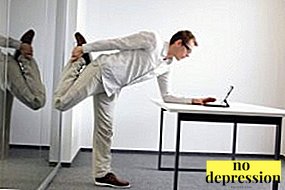The efficiency of the working process depends on both external and internal factors.
And if unwillingness to work It becomes not rare, but rather frequent occurrence, you should definitely understand the root causes.
Why is it so hard to concentrate?

The key to success in any profession - ability to concentrate and not be distracted.
Otherwise, even simple things can turn into a grueling routine, infinitely stretching over time.
However, they often remain unfinished, spoiling the nerves of the performer, who violates all possible deadlines.
It may seem to many that the cause is banal laziness and unwillingness to work. In fact, the reasons lie much deeper, most often are of a psychological nature and are influenced by both external and internal factors.
- Uncomfortable workplace. It is here that people spend most of the time during the day, and therefore any inconvenience can affect the quality of work and mood in general.
The main reason is the wrong arrangement of the table: sitting back to the door a person can not control the situation and subconsciously is in constant emotional stress, being subjected to "attacks" of all who enter the room.
Sitting facing the door is also not the best option, since in this case the person is forced to perform the functions of a “reference” for all those who enter, constantly being distracted from their own affairs. The most comfortable is the workplace, located with his back to the wall and side to the door.
- Big team. When colleagues walk past the desktop every now and then, music is playing in the background, and telephone conversations are constantly going on, not everyone is able to disengage from everyone and concentrate on their tasks. As a result - the accumulating irritability and reduced self-esteem because a person is not able to perform work of high quality.
- Intrusive colleague. In any team there are people who require constant attention, help or sympathy. At the same time, a person is in complete confidence that can distract others from their work at any time, which he does without a shame of conscience. As a rule, he finds himself a "good soul", which tells about his troubles and failures, problems with the husband / wife or asks for help with the report. And it can continue indefinitely.
The only way out is to make the person understand that his requests are not always appropriate and learn to say a firm “no”.
- Lack of order on the table. Mess in the papers - one of the most important irritants, which takes about 30% of the total working time that is spent searching for the necessary folder or document. The same applies to files on a computer: when there are a lot of shortcuts with incomprehensible signatures on the “desktop”, it is rather difficult to understand them. A weekly “revision” of all documents and sorting them into folders and plastic trays will help to correct the situation.
- Internet and telephone. Often, access to the world wide web is the main reason for the lack of success at work. Plunging into the world of social networks, every now and then, checking mailboxes or studying the latest news, many do not even notice how they spent half of their working day there, forgetting about current affairs and tasks. The same applies to telephone conversations that are not related to the work process.
- Fear. Fear of not coping with the task or responsibility for its failure is often inherent in young professionals, but is also found in workers with experience. The reason for this is the lack of self-confidence, the inability to ask clarifying questions and ask for help from colleagues.
In this case, the person experiences stress every time, receiving instructions from the authorities.
- Fatigue. Work without days off and holidays leads to exhaustion of the nervous system and the whole body. Most often, a similar picture can be observed in perfectionist workaholics who firmly believe that the whole world will collapse without their presence in the workplace. At the same time, they voluntarily shoulder an unbearable burden in the form of urgent tasks, complex reports and other work that “others cannot do”.
- Lack of motivation. Simply put, a person does not understand why he is doing his job. And when there are no clear goals and prospects - any work turns into a tedious routine, which is impossible to tune in to. Often this happens because of an incorrectly chosen profession, which is not suitable for temperament and literally “pulls” all juices out of a person.



How to tune in to work, if you do not want?
First of all, you need to stop scolding yourself and try to switch your attention to what you don’t want to do.
- Draw up a to-do list. We take out a sheet of paper and write down everything that needs to be done. As a rule, after a clear structuring, it turns out that there are not too many “stuck” tasks, as was previously seen. After that, we distribute them in order of importance and set deadlines for each.
Many work much easier when a specific period of time is set aside to perform a specific task.
This approach allows you to intelligently distribute working time, avoiding constant rummaging.
- We change the approach to work. If due to many hours of work at the computer fatigue has accumulated and the head “stopped working”, it is necessary to take a break, after which to start the task in another way.
 For example, the same report or presentation can be jotted down with a pen on a piece of paper. This will allow you to switch thoughts and take a fresh look at the task, and then return to its usual performance.
For example, the same report or presentation can be jotted down with a pen on a piece of paper. This will allow you to switch thoughts and take a fresh look at the task, and then return to its usual performance. - Stop postponing. It is very important to start a working day not with viewing mail and news, but with performing at least small but specific tasks. This approach will allow you to quickly plunge into the workflow, rather than postpone your direct responsibilities, preferring to them a cup of coffee, an “important” conversation with a colleague, or a search for “urgent” letters.
- Restore strength. It is possible that the reluctance to work due to the banal fatigue.
In this case, you need to take a break, but it is better to take a day off or a vacation, during which time you should try to completely disconnect from your work moments.
As a rule, a full-fledged (better - active) rest allows you to recover not only physically, but also emotionally, and with new forces to return to work duties.
- Connect the imagination. There is one interesting exercise that allows you to take a different look at the task, which does not want to be done. We close our eyes, relax and imagine that the task has already been completed. We try to feel relief, “hear” the words of praise and “get” a good award. We try to remember our emotions, after which we open our eyes, and inspired by the prospects, we proceed to the process.

How to concentrate on tasks?
Concentrating on task accomplishment will allow you to:
- Realization of a realistic goal. This means that you must clearly represent the outcome of your current work. The specific goal should always be present in the head, driving away all extraneous factors that prevent its achievement in the planned period.
Besides the fact that this method is the most powerful motivator and keeps us in good shape, it also allows you to determine at what stage you are, and what remains to be done.
- Mandatory completion of cases. No matter how much you want to quit tedious work and do something more enjoyable - you should not be tempted. In order to avoid the mass of unfinished business, which is similar to a snowball, it is important to complete the job without fail, and only then proceed to the following tasks.
- Positive thinking. As a rule, those who justify the inability to focus on work, poor health and domestic problems, in the end, all this and get it. Therefore, we stop complaining about the fate of the villain and the boss-tyrant, “put on” a smile and proceed to fulfill our duties.
- Proper organization of the workplace. At your desk just need to feel comfortable. If this is not the case, you should understand and eliminate the cause. All items on the work surface should be placed depending on the frequency of use. A desk lamp is better to choose with daylight, which does not create a feeling of home comfort and does not dispose to sleep. It is equally important to keep order not only on the surface of the table, but also in the computer.
Solve the problem will allow regular sorting of all papers, held at the end of each working week.
- Regular breaks. It has been proven that labor productivity manifests itself in the form of three cycles: infusion into the workflow (up to 15 minutes), effective labor (30 minutes) and gradual exhaustion (45 minutes after the start of work). Small (about 10 minutes) breaks between these stages allow you to maintain a fairly high level of concentration and performance. No less useful change of activity.
- Compliance with the regime. No matter how trite it may sound, but a full sleep and a balanced diet are the key to successful and productive activities. Lack of sleep and junk food adversely affect not only health, but also on performance. To get enough sleep, it is important to go to bed before midnight for at least 7-8 hours. Categorically you should not neglect breakfast and lunch, “filling up” them with a late and too-high-calorie dinner.


How to be attentive?
To become attentive, you need this as you want. You need to understand why you are in the workplace and are trying to perform certain tasks. Only then there will be an incentive to do the work qualitatively, and attentiveness will increase significantly. And the following techniques will help her in this:
- We concentrate on one object. For this, it is very important to be able to prioritize and highlight the most important. Help lists and clear planning. The notion of what is top priority at the current time is half the battle.
When all the excess goes into the background, work on a specific task will go much faster and will be as efficient as possible.
- Clear thoughts. The head, like a memory card, can be overloaded with a variety of information. At the same time, often a great part of the “flash drive” is occupied by past insults, unpleasant memories and disappointments, which constantly and again appear in the mind and make it difficult to tune in to current affairs. It is necessary to get rid of such information regularly: keeping a diary is suitable for someone, it will be easier for someone to just pronounce emotions out loud.
- We are not afraid of change. If, despite all attempts to become as attentive as possible at work, one fails, it is important to honestly answer the question: do I like what I do? It is possible that in this way the subconscious mind makes you understand that it is time to change the hated work and try yourself in a completely new field.

In any work important incentive and clear vision of the ultimate goal. Properly organizing the workplace, eliminating all the stimuli and carefully planning the process, you can increase concentration of attention several times.
But if, despite all the efforts "things are still there", you should think about a possible change of activity. After all, when work is a joy, nothing can prevent its implementation!
How to focus and tune in to work? Techniques:

 For example, the same report or presentation can be jotted down with a pen on a piece of paper. This will allow you to switch thoughts and take a fresh look at the task, and then return to its usual performance.
For example, the same report or presentation can be jotted down with a pen on a piece of paper. This will allow you to switch thoughts and take a fresh look at the task, and then return to its usual performance.

